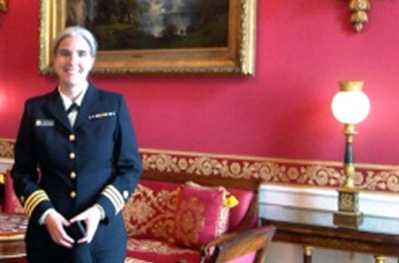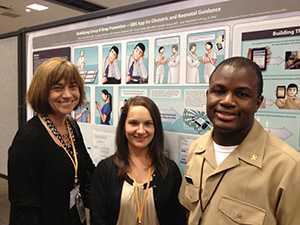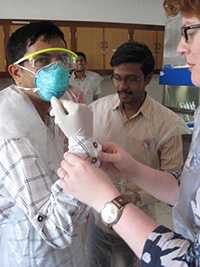Division of Bacterial Diseases (DBD) News Bulletin
This website is archived for historical purposes and is no longer being maintained or updated.
April 16, 2013: Content on this page kept for historical reasons.
In This Issue
- Best Wishes
- Quarter 1
- Quarter 2
- Quarter 3
- Quarter 4
- 2013 Events
Winter 2012
Quarter 3
2012 NCIRD Honor Award Recipients
The NCIRD Honor Awards are awarded annually from peer-submitted nomination narratives that thoroughly describe the nominee’s achievements. Nominations were reviewed and ranked for the 38 CDC/ATSDR Award categories by a NCIRD Awards Committee. The highest ranking nominations were sent forward to the agency. DBD staff members honored this year are listed below:

CDR Jennifer Rabke Verani (USPHS) MD, MPH, a medical epidemiologist in RDB, was one of two CDC scientists who received the 2011 Presidential Early Career Awards for Scientists and Engineers (PECASE), the highest honor bestowed by the US government on science and engineering professionals in the early stages of their independent research careers. Jennifer visited the White House before the awards ceremony. Jennifer received the PECASE award for innovative public health research to improve child survival worldwide through enhanced perinatal disease prevention and advances in the prevention of parasitic diseases and pneumonia in the world’s poorest countries.
Enhancing Laboratory Capacity—recognizing outstanding commitment to enhance the capacity and build sustainability of global laboratories to diagnose, treat and prevent bacterial diseases through training, consultations and collaborative research by laboratory staff across the division—a cast of 34.
Robert Gertz for Outstanding Team Player Award—During a time of high Streptococcus Laboratory team attrition, Robert voluntarily assumed vacated essential tasks with a high level of professionalism and production.
Gail Langley for Innovation in Surveillance Award—Gail’s award was in recognition of outstanding creativity, innovation, and persistence with leading CDC’s ABCs in new directions.
Tamara Pillishvili for Rising to the Challenge Award—This award was presented in recognition of Tamara’s work in rising to the challenge of leading ACIP’s first discussions on adult pneumococcal conjugate vaccine use and coordinating a cross-center cleaner-burning stove assessment in Kenya.
Stephanie Schrag for Excellence in Leadership Award—Stephanie provided key input to several activities that were new for CDC, including evaluations of better cookstoves to reduce indoor air pollution, an evaluation of the causes of neonatal sepsis using cutting edge techniques and development of an app to help clinicians use CDC’s guidelines for neonatal group B strep disease (NCIRD nominated Stephanie for the 2012 CDC Excellence in Leadership Award.)

Maureen Marshall (NCIRD) joined Alison Patti and Jonathan Wortham at the CDC National Conference on Health Communication, Marketing and Media to review RDB’s poster on Mobilizing Group B Strep Prevention—GBS App for Obstetric and Neonatal Guidance that highlights design of a mobile web application to increase implementation of the Guidelines for Prevention of Perinatal Group B Streptococcal Disease by neonatal and obstetric clinicians.

Steve Hadler (far right) with Cui Fuqiang from the CDC China National Immunization Program, DBD’s Jennifer Liang and former ISD Director Lance Rodewald (now detailed to WHO China Office) share dinner in Beijing, China in September, following participation in a national workshop on surveillance for meningococcal meningitis and pertussis, hosted by the China CDC National Immunization Program (NIP), Lanzhou, China in September.

DBD microbiologist Carla Talarico helps laboratorian Ranjith Jeyaraman don personal protective equipment before testing specimens for Streptococcus pneumoniae at the WHO Regional Reference Laboratory in Vellore, India, where she conducted lab capacity-building training for staff. Streptococcus pneumoniae, or pneumococcus, is a leading cause of morbidity and mortality among children worldwide and particularly in developing countries.
- Page last reviewed: April 16, 2013 (archived document)
- Content source:


 ShareCompartir
ShareCompartir